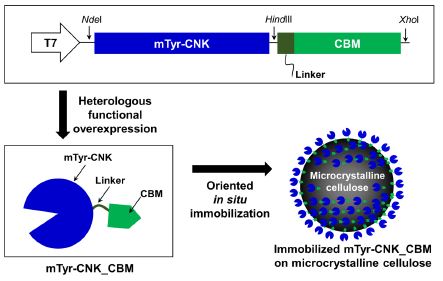Background: Catechol-containing polymers such as mussel adhesive proteins (MAPs) are attractive as biocompatible adhesive biomaterials, and the catecholic amino acid 3,4-dihydroxyphenyl-L-alanine (DOPA) is considered a key molecule in underwater mussel adhesion. Tyrosinases can specifically convert tyrosine to DOPA without any cofactors. However, their catalytic properties still need to be adjusted to minimize unwanted DOPA oxidation via their diphenolase activity and catechol instability at neutral and basic pH values in the reaction products.
Methods and Results: In this work, we constructed a novel functional tyrosinase, mTyr-CNK_CBM, by fusion of mTyr-CNK with a cellulose-binding motif (CBM) for oriented in situ immobilization on microcrystalline cellulose via the C-terminal CBM without any additional purification steps. mTyr-CNK_CBM showed optimal catalytic activity at pH 4.5-6.5 and room temperature and had a high monophenolase/diphenolase activity ratio (Vmaxmono/Vmaxdi = 2.08 at pH 6 and 25 °C). mTyr-CNK_CBM exhibited 2.17-fold higher (as a unimmobilized free enzyme) and similarly high (upon immobilization) in vitro DOPA modification of a bioengineered MAP compared to a commercially available mushroom tyrosinase. Moreover, the immobilized mTyr-CNK_CBM showed long-term storability and improved reusability.
Conclusions: These results clearly demonstrate a strong potential for practical use of immobilized mTyr-CNK_CBM as a monophenol monooxygenase in preparing biocompatible DOPA-tethered biomaterials and other catechol-containing polymers.



















